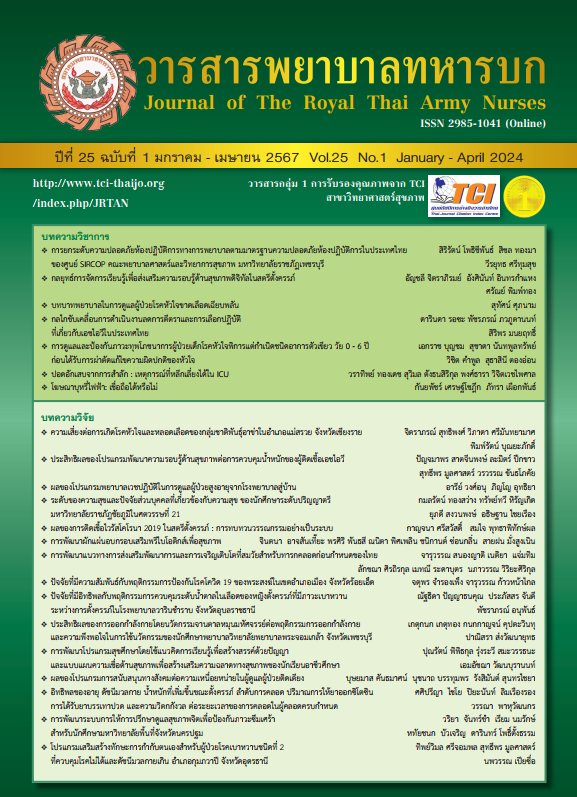The Effect of a Self-Care Program Via Line Application on Self-Care in Patients undergoing Percutaneous Coronary Intervention
Keywords:
percutaneous coronary interventions, smartphone application, self-careAbstract
This randomized controlled trial aimed to study effects of the self-care program via the LINE application on self-care in patients undergoing percutaneous coronary intervention.
The IMB model was used as a conceptual framework. The participants were 58 patients with coronary artery disease aged 20 years and up who were scheduled for a percutaneous coronary intervention for the first time at a supertertiary hospital in Bangkok. All participants were randomly assigned to the experimental (N = 29) and control groups (N = 29). The control group received routine care while the experimental group received routine care and self-care program via the LINE application for 14 days. Data collection instruments consisted of 1) the demographic and health information questionnaire 2) The coronary artery disease knowledge and self-care questionnaire 3) The dual anti-platelet medications knowledge questionnaire 4) The self-care after undergoing percutaneous coronary intervention questionnaire and 5) The Self-Care program via Line application. All instruments were considered for coverage, accuracy and suitability of content and language used by five qualified experts. Descriptive statistics and t-test were used to analyze the data. The sample was male (75.90%). 74.20% were older than 55. The experimental group had a mean age of 57.72 years (SD = 10.87) and the control group had a mean age of 65.97 years (SD = 13.09), the sample in both groups was found to have no differences (p > .05). At post-test, mean scores of self-care in the experimental group were significantly higher than that at pre-test (p < .01) and more than the control group with statistical significance (t = 20.96, p < .01).
Downloads
References
Tsao CW, Aday AW, Almarzooq ZI, Alonso A, Beaton AZ, Bittencourt MS, et al. Heart disease and stroke statistics-2022 update: A report from the American Heart Association. Circulation. 2022;145(8): e153-e639.
The Heart Association of Thailand under the Royal Patronage. Thai Acute Coronary Syndromes Guidelines 2020. Bangkok. The Heart Association of Thailand under the Royal Patronage; 2020.
Batiha A-M, Abu-Shaikha HS, Alhalaiqa FN, Jarrad RA, Abu Ramadan HJ. Predictors of complications after sheath removal post transfemoral percutaneous coronary interventions. Open Journal of Nursing. 2016;06(06): 497-504.
Damrongsin S., Putwatana P., Khuwatsamrit K. Self–care behaviors among patients with coronary in-stent restenosis. The Journal of The Royal Thai Army Nurses. 2017;18(2): 220-7. (in Thai)
Rerkluenrit J. Effect of learning-activatedtelephone-home visiting (lath) program on quality of life among patients with coronary artery disease. Thai Journal of Cardio-Thoracic Nursing. 2019;30(1): 89-100. (in Thai)
Srijun J., Kaveevivitchai C., Neelapaichit N., Chantadansuwan T. Effects of Self-EfficacyPromoting Program with Cartoon Animation Videos on Knowledge, Anxiety, and Perceived Self-Efficacy in Patients Undergoing Cardiac Catheterization. Journal of Thailand Nursing and Midwifery Council, 2018;33: 89-102. (in Thai)
Yadav S, Sethi R, Pradhan A, Vishwakarma P, Bhandari M, Gattani R, et al. ‘Routine’ versus ‘Smart Phone Application Based-Intense’ follow up of patients with acute coronary syndrome undergoing percutaneous coronary intervention: Impact on clinical outcomes and patient satisfaction. International Journal of the American College of Cardiology. 2021;35: 100832.
Guo J, Zhang H, Zhang H, Zhang L, Zhao L. Application of continuous nursing based on WeChat platform in patients with coronary heart disease after intervention therapy. Revista de Investigación Clínica. 2020;61: 298.
Fisher JD, Fisher WA. Changing AIDS-risk behavior. Psychological Bulletin. 1992;111(3): 455-74.
Lee J, Lee H. The effects of smart program for patients who underwent Percutaneous Coronary Intervention (SP-PCI) on diseaserelated knowledge, health behavior, and quality of life: a non-randomized controlled trial. Journal of Korean Academy of Nursing. 2017;47(6): 756-69.
Boonkua C., Wattanakitkrileart D., Sriprasong S., Dumavibhat C. Factors predicting adherence to dual antiplatelet medications among patients with Acute Coronary Syndrome after Percutaneous Coronary Intervention. Nursing Science Journal of Thailand. 2022;40: 60-75. (in Thai)
Athilingam P, Jenkins B, Johansson M, Labrador M. A mobile health intervention to improve self-care in patients with heart failure: pilot randomized control trial. Journal of Medical Internet Research Cardio. 2017;1(2): e3.
Jeon E, Park HA. Experiences of patients with a diabetes self-care app developed based on the information-motivation-behavioral skills model: before-and-after study. Journal of Medical Internet Research Diabetes. 2019; 4(2): e11590.
Mahaviriyotai K., Wattanakitkrileart D., Poungkaew A. The effect of information provision, motivation, and self-monitoring skill program through LINE application on self-care behaviors in patients with Heart Failure. Nursing Science Journal of Thailand. 2021;39(1): 47-63. (in Thai)
Downloads
Published
How to Cite
Issue
Section
License
Copyright (c) 2024 Journal of The Royal Thai Army Nurses

This work is licensed under a Creative Commons Attribution-NonCommercial-NoDerivatives 4.0 International License.
บทความหรือข้อคิดเห็นใดใดที่ปรากฏในวารสารพยาบาลทหารบกเป็นวรรณกรรมของผู้เขียน ซึ่งบรรณาธิการหรือสมาคมพยาบาลทหารบก ไม่จำเป็นต้องเห็นด้วย
บทความที่ได้รับการตีพิมพ์เป็นลิขสิทธิ์ของวารสารพยาบาลทหารบก
The ideas and opinions expressed in the Journal of The Royal Thai Army Nurses are those of the authors and not necessarily those
of the editor or Royal Thai Army Nurses Association.






